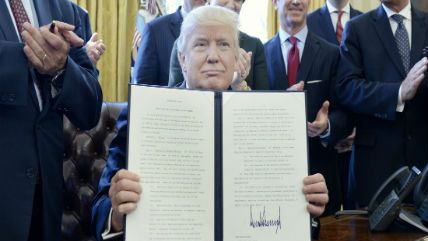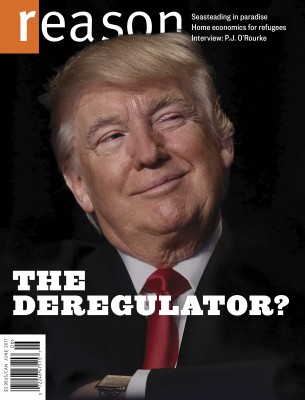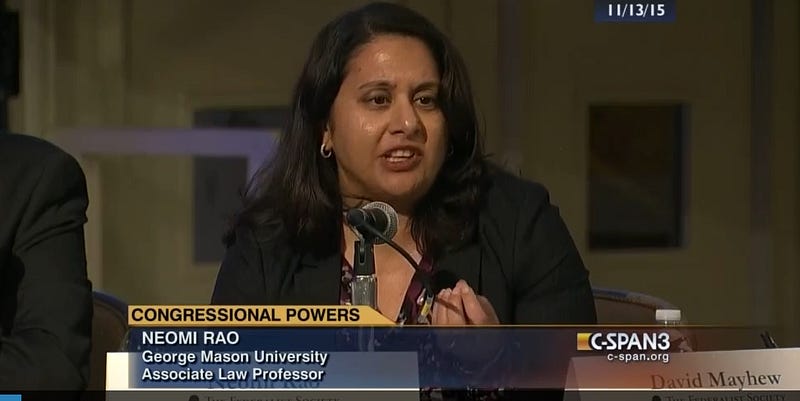Report: Regulation 'Has Essentially Ground to a Halt' Under Trump
The Obama administration submitted 118 new rules in the same time it has taken Trump to make just 39


Is Donald Trump really turning out to be a deregulatory president? And is his gimmicky kill-two-regs-for-each-new-one executive order (which, I've come to find out, is known as the "Stossel Rule") actually making a dent in the administrative? Yes to both, argues an article today in Bloomberg BNA. The evidentiary nut:
Since President Donald Trump was sworn into office Jan. 20, just 39 rules have been submitted for review to the Office of Information and Regulatory Affairs (OIRA), the agency that reviews all significant federal regulations. There are currently 16 pending agency actions.
By comparison, the administration of fomer President Barack Obama had submitted 118 rules by the same point in the president's first year, according to the RegInfo.gov database.
When I was interviewing libertarian regulation types for the June cover story, not a single one treated the two-for-one guidance as a serious deregulatory tool. "It is a fake solution to a very real problem," Ike Brannon, a Bush-era official at the Office of Information and Regulatory Affairs, told me. "It's so easy to conceive of how the EPA could game 'two rules out for one rule in': You pass a whole bunch of half-million-dollar rules, and those are the rules you take off." Even the anti-deregulation hysterics in the media weren't getting too worked up about that particular rule.
But that judgment may have been premature. According to the Bloomberg BNA piece, the requirement throws up a significant obstacle because it seeks not just a numerical swap but an offset on regulatory costs going forward. Since environmental regs in particular tend to front-load the compliance burden on companies, it'll be hard to find enough existing rules (whose main costs have already been swallowed) to zero out the front-end costs of whatever new regulation is being proposed.
"And that's why, in my view, the two-for-one executive order really is not meant as a two-for-one trade at all, but instead just as putting the brakes on new regulations," former Department of Interior deputy assistant secretary Amanda Leiter said at an American Bar Association administrative law roundtable last week.
More in that vein:
Andrew Grossman, partner at Baker & Hostetler LLP and adjunct scholar at the Cato Institute, agreed that the executive order raises an expressly deregulatory agenda and is a "stunningly blunt" tool.
"But that's the point," Grossman said. "Genteel regulatory review hasn't really gotten us anywhere. So let's just be clear about what it is that we're trying to achieve. Less regulation."
Score one for the Stossel Rule!

Another leading indicator that deregulatory types told me to look out for was Trump's pick to head up the Office of Information and Regulatory Affairs (OIRA), which applies (at least in theory) cost-benefit analyses to new regulations. So who did he end up choosing? Neomi Rao, a former law clerk for Clarence Thomas and founder of the Center for the Study of the Administrative State at George Mason University's Antonin Scalia Law School. Can't deconstruct the damn thing if you don't study it first.
Here's the Denver Post sounding the alarm:
In articles and congressional testimony, Rao also has advocated limiting the authority of federal agencies to draw up rules in areas left ambiguous by legislation. She has said that Congress must spell out clearly what it wants agencies to do. Critics, however, say that when it comes to technical regulations, lawmakers lack the expertise to write detailed regulations the agencies are better equipped to draw up.
Rao has called on the courts to review the judicial principle known as Chevron deference, which leaves it up to agencies to interpret ambiguously worded statutes to fulfill legal mandates.
"Deference is one consequence of Congress leaving a significant interpretive space for administrative agencies," she said in March 17, 2016, testimony to the Senate Homeland Security Committee's governmental affairs subcommittee. That error has been compounded by the courts, she said, which also have deferred to agencies and have "allowed for the expansion of the administrative state outside the checks and balances of the Constitution."
Rao's confirmation hearing has yet to be scheduled, as far as I can discern. Meanwhile, as Eric Boehm pointed out last week, Congress is making some deregulatory noises as well. With the Trump presidency in an ongoing state of crisis management, and his legislative agenda foundering at best, these largely under-the-radar regulatory slowdowns and positive reforms may prove to be the most tangibly useful aspects of his White House tenure.


Show Comments (32)